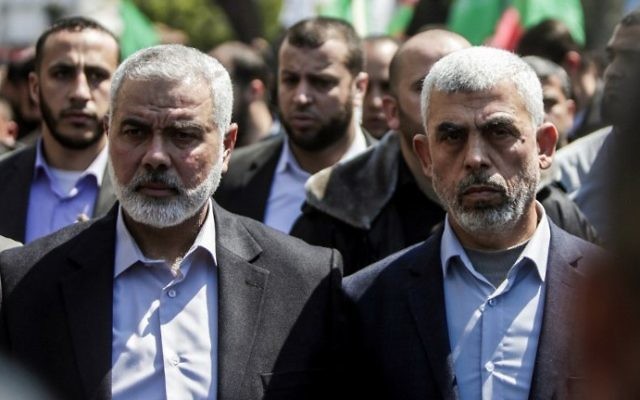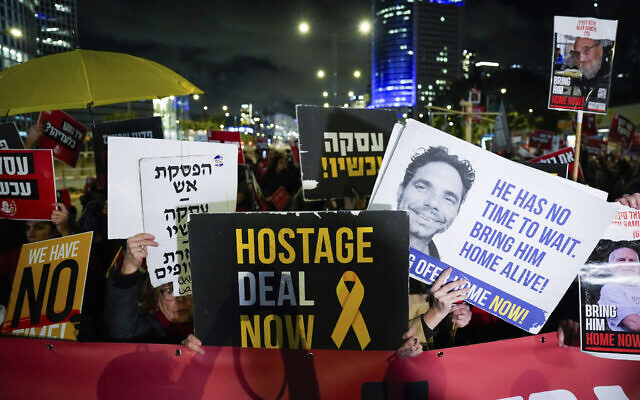



Internal divisions among Hamas leaders are preventing the Palestinian terror group from backing a proposed hostage release deal that would include a pause to the fighting in the Gaza Strip, the Wall Street Journal reported on Friday.
According to the report, the prevailing dynamic within Hamas has flipped, with the terrorist organization’s chief in Gaza, Yahya Sinwar, backing a temporary truce while its leaders outside of the Strip are pushing for further Israeli concessions and a permanent ceasefire.
Unnamed officials familiar with the negotiations told the Wall Street Journal that Sinwar wants a six-week halt to the war so Hamas operatives can regroup and more aid can enter Gaza. Politburo chief Ismail Haniyeh, however, is pushing for a permanent ceasefire with international guarantees and a plan for rebuilding the enclave.
“Their families are being killed,” one of the officials who spoke to the Wall Street Journal said of Hamas leaders in Gaza, in apparent reference to their supposed willingness to agree to the proposal.
Hamas officials have been saying that the terror group was studying the proposed temporary truce deal that would include prolonged pauses in fighting in Gaza and swaps of Israeli hostages for Palestinian prisoners, but at the same time appeared to rule out some of its key components on Friday.
Haniyeh’s office said Friday that the terror chief held a phone call with Palestinian Islamic Jihad leader Ziad Nakhaleh to discuss the proposed deal. According to a statement from Haniyeh’s office, the two agreed any deal with Israel for the release of hostages must be accompanied by a complete halt to the fighting, the withdrawal of Israeli forces from Gaza, ending the blockade, reconstruction of the Strip and the freeing of Palestinian security prisoners.
Such steep demands would seem to be non-starters for Israel, which has vowed to dismantle Hamas following its October 7 shock onslaught in which thousands of Hamas-led terrorists killed 1,200 people across southern Israel, mostly civilians, and took 253 hostages of all ages.
A delegation of Hamas leaders traveled to Cairo on Thursday for talks with Egyptian officials, including the head of Egyptian intelligence, Major General Abbas Kamel, on the possible deal, the outline of which was drawn up during a meeting in Paris last week in the presence of Israeli and US officials, as well as Qatari and Egyptian negotiators.
According to some reports, the outline offers the possibility of a six-week pause in fighting in Gaza for the first time since late November, and the release of all 136 hostages still in Gaza, not all of whom are alive. Other reports, however, have said the framework provides for the release of only 35 hostages — women, the elderly and the sick — during a 35-day initial truce, with the potential for another week’s pause in fighting during which negotiations could be held on further releases. Still other reports have cited differing terms in the unconfirmed framework deal.
A senior Egyptian official familiar with the discussions on Friday described the proposal to The Associated Press, saying it includes an initial truce of six to eight weeks during which Hamas would release elderly hostages, women and children in return for hundreds of Palestinians jailed by Israel.
Throughout that phase, negotiations would continue on prolonging the truce and releasing more prisoners and hostages. Israel would allow the number of aid trucks entering Gaza to increase to up to 300 daily — from a few dozen currently — and let displaced Gaza residents gradually return to their homes in the north, according to the proposal.
Hamas and other terror factions are holding onto 132 of the 253 hostages taken on October 7, following a weeklong November truce deal that saw the release of 105 civilians, mostly women and children.
The IDF has said 29 of the 132 are dead, citing intelligence and findings obtained by troops operating in Gaza. One more person is listed as missing since October 7, and their fate is still unknown. Hamas is also holding the bodies of fallen IDF soldiers Oron Shaul and Hadar Goldin since 2014, as well as two Israeli civilians, Avera Mengistu and Hisham al-Sayed, who are both thought to be alive after entering the Strip of their own accord in 2014 and 2015 respectively.
A senior Israeli official told NBC News Friday that it was unclear that a new deal would come to fruition.
“I don’t think it’s more than 50/50 it will materialize,” the unnamed senior official said.
Unnamed ministers also told Channel 12 news that a deal was far from certain.
Israel’s war cabinet met earlier this week to discuss the proposal and met again Thursday evening for more talks.
Hebrew media reported Friday that ministers voiced opposition to several elements of the proposed deal, including its phased nature.
Meanwhile, US Secretary of State Antony Blinken is set to travel to the Middle East next week as part of efforts to secure a hostage release deal and a pause in fighting. It will be his fifth regional tour since the outbreak of the Israel-Hamas war.
Blinken will start his five-day trip in Saudi Arabia on Sunday before proceeding to Egypt, Qatar, Israel and the West Bank, the State Department said.


